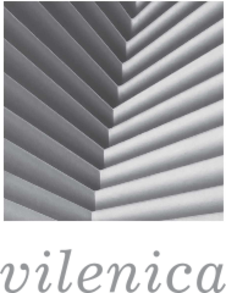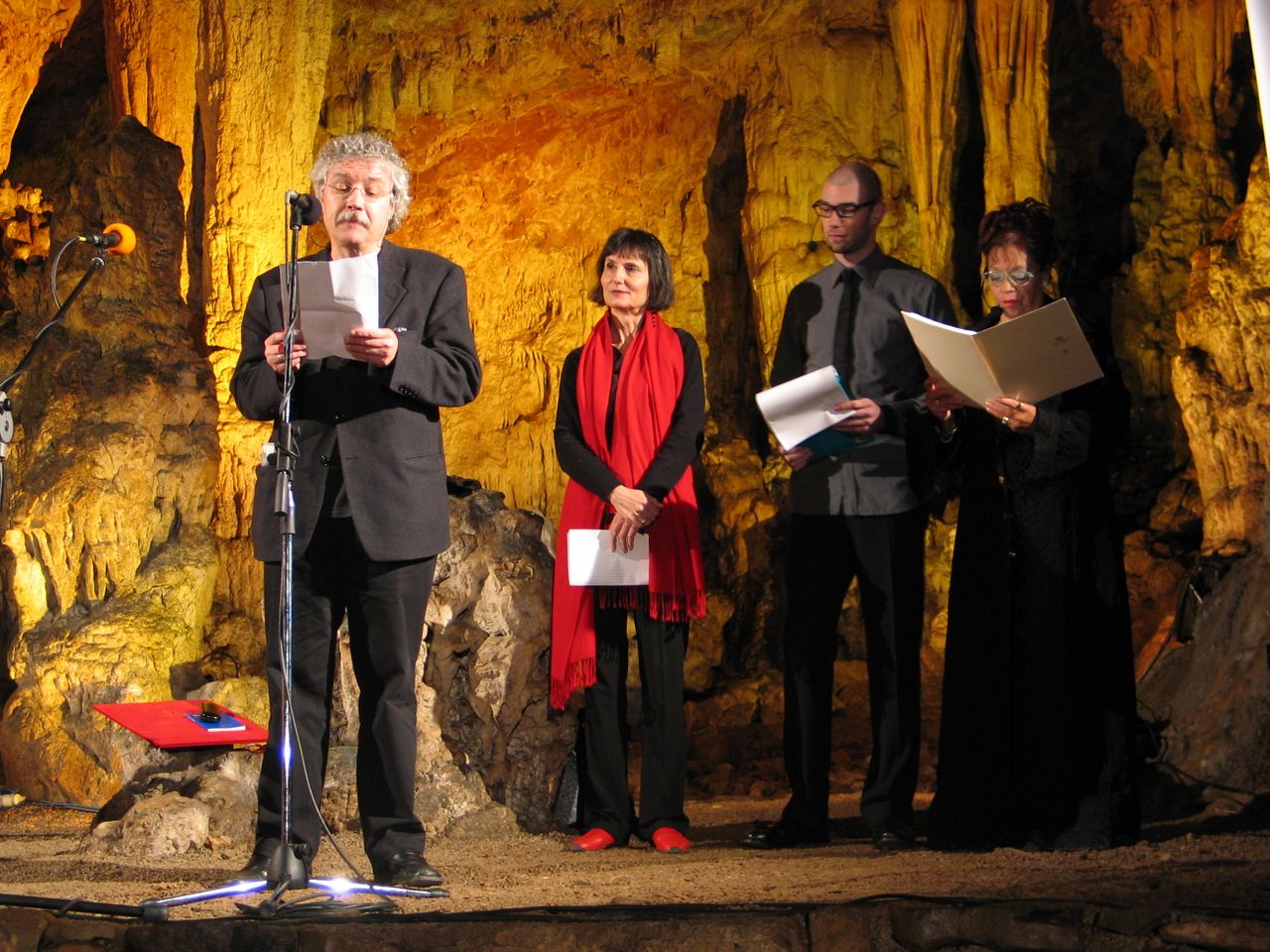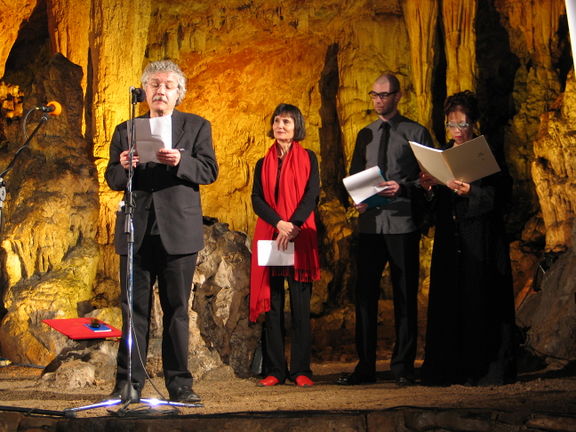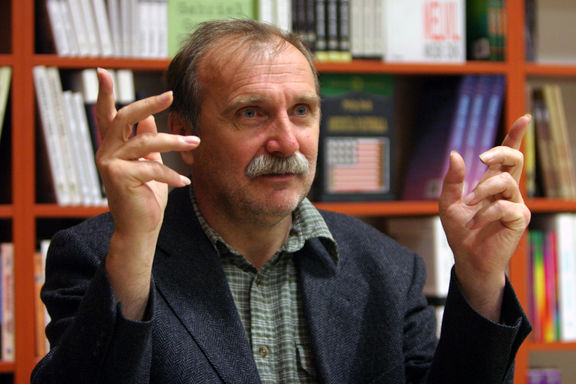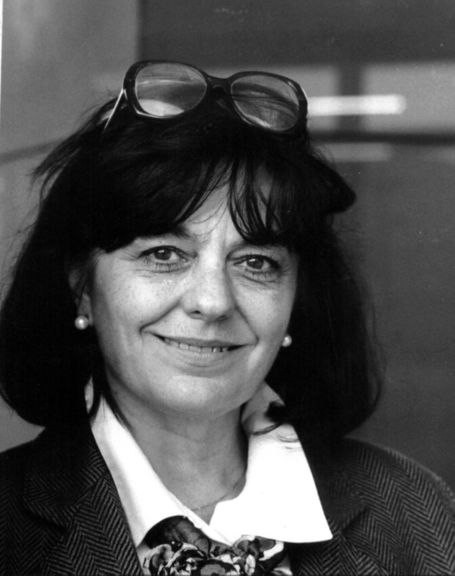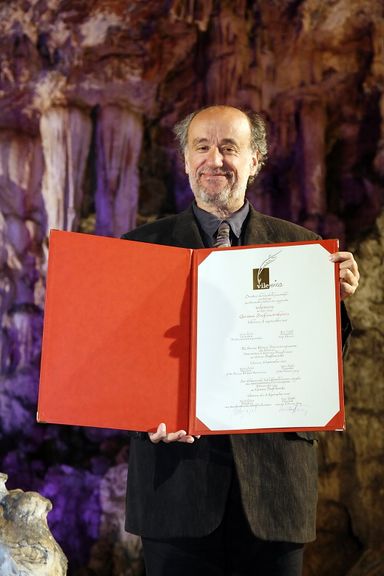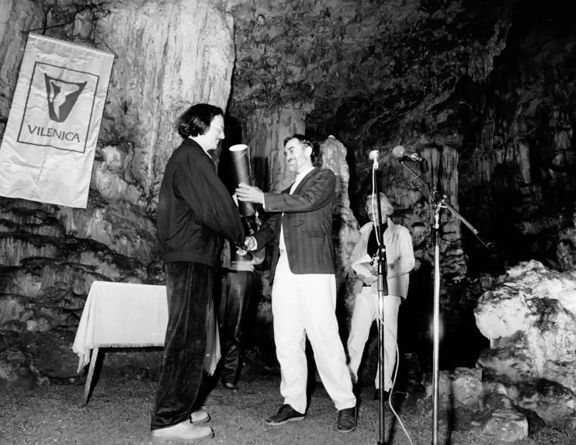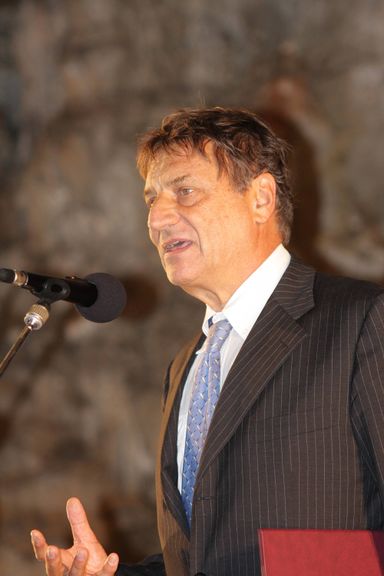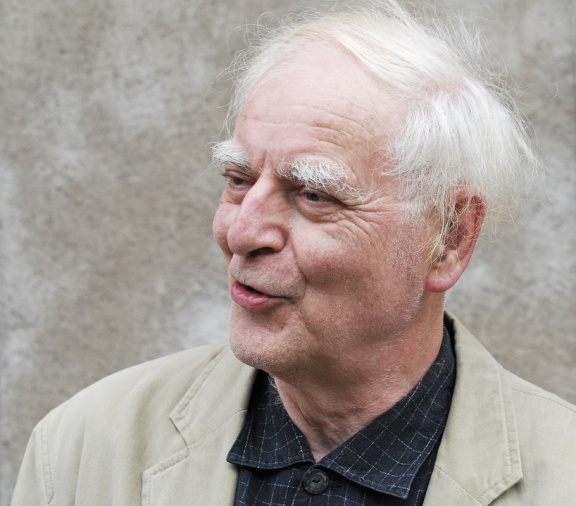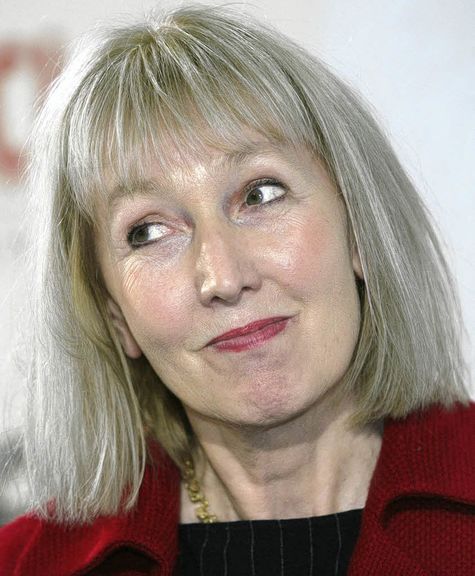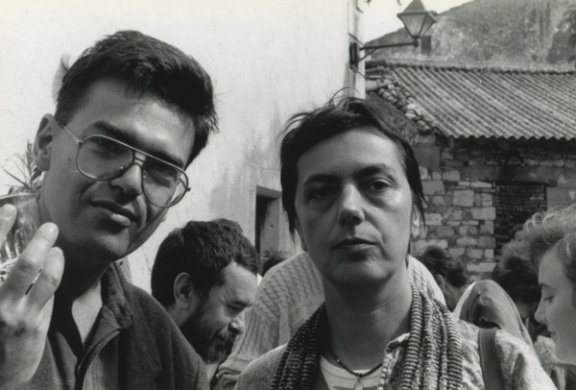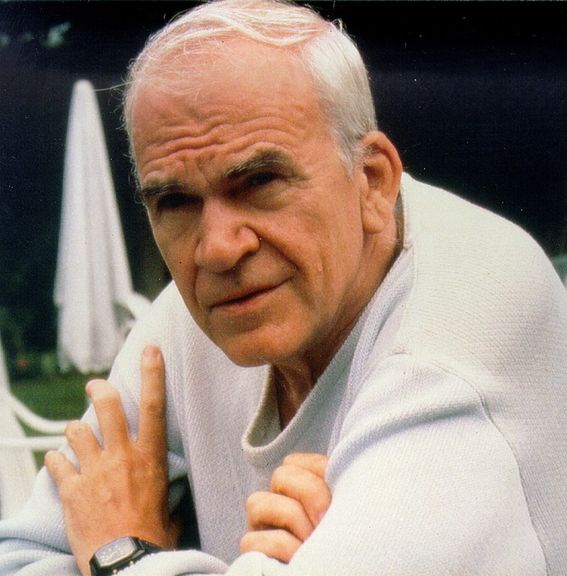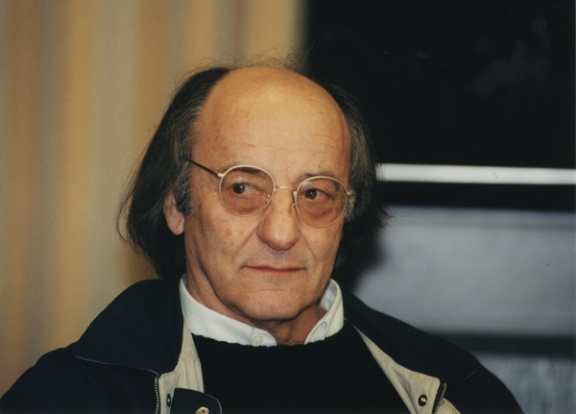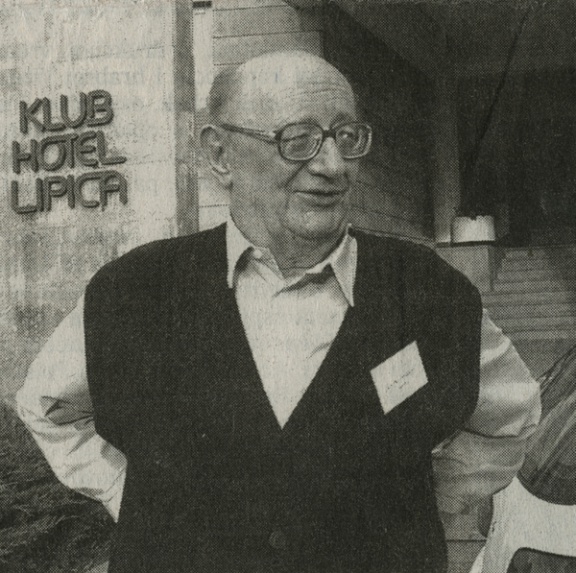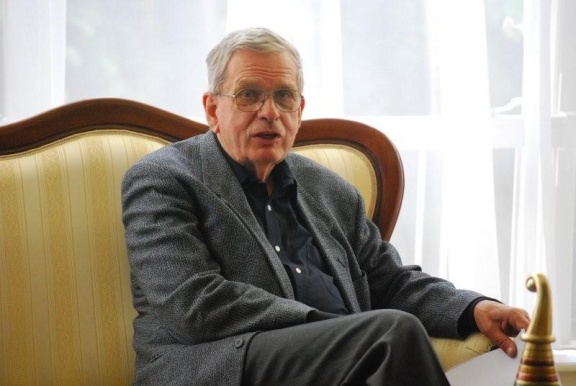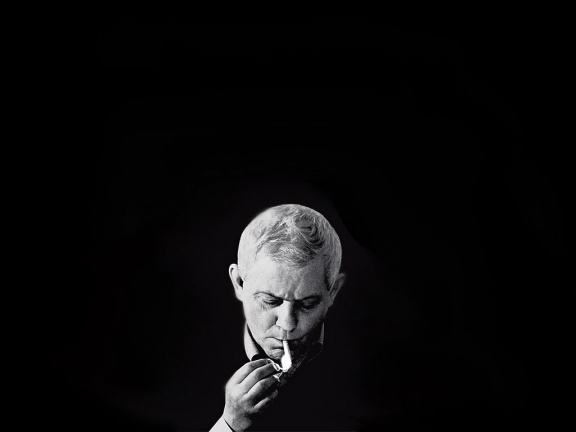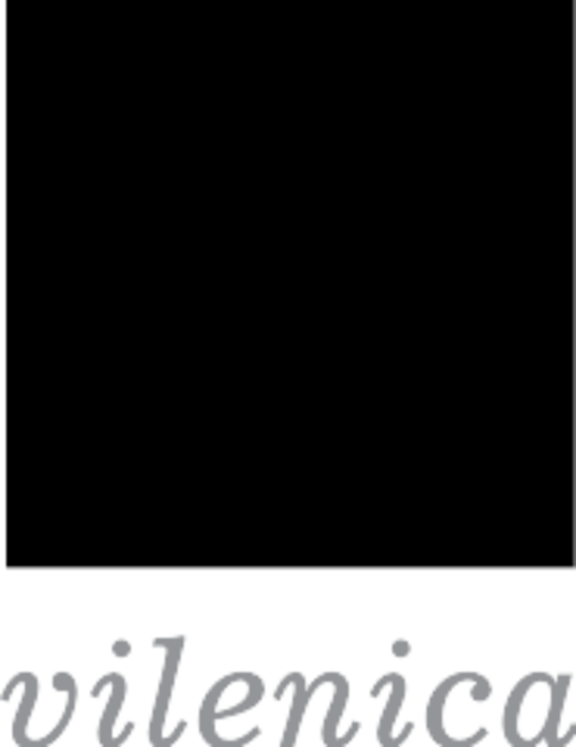Difference between revisions of "Vilenica International Literary Festival"
(Created page with '{{Infobox Venue |Name=Mednarodni literarni festival Vilenica |Street address=Društvo slovenskih pisateljev, Tomšičeva 12, SI-1000 Ljubljana, Slovenia |Telephone=386 (0) 1 251 ...') |
|||
| (80 intermediate revisions by 13 users not shown) | |||
| Line 1: | Line 1: | ||
| − | {{ | + | {{Article |
| − | | | + | | status = NEEDSUPDATE INFOBOX TOPROOFREAD NIFERTIK! |
| − | | | + | | maintainer = Simon Smole |
| − | |||
| − | |||
| − | |||
| − | |||
| − | |||
| − | |||
| − | |||
| − | |||
| − | |||
| − | |||
}} | }} | ||
| + | {{Infobox | ||
| + | | name = Vilenica International Literary Festival | ||
| + | | localname = Mednarodni literarni festival Vilenica | ||
| + | | logo = Vilenica International Writers’ Gathering (logo).svg | ||
| + | | street = Vilenica International Literary Festival, Društvo slovenskih pisateljev, Tomšičeva 12 | ||
| + | | town = SI-1000 Ljubljana | ||
| + | | telephone = 386 (0) 1 251 4144 | ||
| + | | fax = 386 (0) 1 421 6430 | ||
| + | | email = info@vilenica.si | ||
| + | | website = https://vilenica.si/ | ||
| + | | frequency = annual | ||
| + | | dates and duration = September, early, 5 days | ||
| + | | duration weeks = 36 (2012) 37 (2013) 36 (2014) | ||
| + | | festival dates = 1.9.2015 - 6.9.2015, 6.9.2016 - 11.9.2016, 5.9.2017 - 10.9.2017, 4.9.2018 - 9.9.2018, 10.9.2019 - 15.9.2019, 8.9.2020 - 13.9.2020, 7.9.2021 - 12.9.2021, 5.9.2022 - 11.9.2022, 5.9.2023 - 10.9.2023, 2.9.2024 – 7.9.2024 | ||
| + | | founded by = Slovene Writers’ Association | ||
| + | |organised by = Slovene Writers’ Association | ||
| + | |organised by 2 = KUD Vilenica Art Society | ||
| + | |contacts = | ||
| + | {{contact | ||
| + | |name = Nana Vogrin | ||
| + | |role = Project head, Producer | ||
| + | |email = nana.vogrin@vilenica.si | ||
| + | }} | ||
| + | {{contact | ||
| + | |name = Aljaž Koprivnikar | ||
| + | |role = Public relations | ||
| + | |email = aljaz.koprivnikar@vilenica.si | ||
| + | }} | ||
| + | {{contact | ||
| + | |name = | ||
| + | |role = | ||
| + | |email = | ||
| + | }} | ||
| + | | accounts = https://www.facebook.com/vilenica.si/ | ||
| + | https://twitter.com/vilenicaf | ||
| + | }} | ||
| + | |||
| + | |||
| + | {{Teaser| | ||
| + | |||
| + | The first [[Vilenica International Literary Festival]] was organised in [[established::1986]] by the [[Slovene Writers’ Association]] and [[Veno Taufer]], though its origins go back to 1980, when literary meetings were organised by the [[Municipality of Sežana]] in the karst cave of Vilenica, after which the festival takes its name. To date the event has developed into an important Central European gathering of writers and the biggest festival of this sort in Slovenia, hosting more than 100 guests every year in the early autumn. The main festival programme is held in Lipica and the Karst region, while a number of events are organised all over Slovenia. | ||
| + | |||
| + | {{Wide Image|Vilenica Literary Awards - Gauss Rakusa - 2005.JPG}} | ||
| + | |||
| + | }} | ||
| + | |||
| + | |||
| + | |||
| + | ==Organisation== | ||
| + | In organising this event, the [[Slovene Writers’ Association]] and the [[KUD Vilenica Art Society]] cooperate with various organisations including the [[Municipality of Sežana]], the [[Kosovel Culture House Sežana]], the Sežana Caving Association, the Lokev Community Council, and the Tourist Association of Štanjel. | ||
| + | |||
| + | The Vilenica International Literary Festival is financially supported by the [[Slovenian Book Agency]], the Central European Initiative (CEI), the Culture Programme of the European Commission, the [[Municipality of Sežana]], private sponsors, and others. | ||
| − | == | + | ==Programme== |
| + | The Vilenica festival features a wide array of literary and cultural events, readings, symposia, literature presentations, round-table discussions, a book fair, all with a view to promoting literature and authors among professionals and the general public. Some of them are aimed at authors, translators, publishers, and literary scientists, affording opportunities to discuss topical issues and arising trends, while others set a relaxed atmosphere perfect for informal meetings and networking. Every year a different literature and a Slovene author are put into focus, while the motto of the festival changes with regard to current topics in contemporary literature. | ||
| − | + | ==Awards== | |
| − | + | The highlight of the festival is the [[Vilenica International Literary Awards|Vilenica International Literary Prize]], which is bestowed upon a Central European author for outstanding achievement in literature or essay writing. The ceremony is held in the Karst cave Vilenica and is accompanied by music and dance performances. | |
| − | + | The [[Vilenica International Literary Awards|Crystal Vilenica]] is given to an author from Central Europe for the finest contribution to the ''Vilenica Almanac'' at a literary reading at the Štanjel castle. | |
| − | + | Organised by [[KUD Vilenica Art Society|KD Vilenica]], the [[Vilenica International Literary Awards|Young Vilenica Award]] is presented to authors up to the age of 15. The winners are given the opportunity to read their poetry at the festival. | |
| + | |||
| + | The winner of the [[CEI Fellowship for Writers in Residence]] is a guest of the Vilenica festival, where the fellowship is awarded. | ||
| − | === | + | ==Publications== |
| + | A programme booklet offers basic information and timetables on festival events, as well as information on the participating authors and other performing artists. The booklet is particularly useful as it contains an overview of the participants, their work, and contact information. | ||
| − | + | The central publication is the ''Vilenica Almanac'', published since the very beginning of the festival. It features a presentation of the [[Vilenica International Literary Awards|Vilenica International Literary Prize]] winner and a selection of poetry or prose by the participating authors (published in the source language, in Slovenian, and in English). The ''Almanac'' also includes the winning poems of the [[Vilenica International Literary Awards|Young Vilenica Award]]. | |
| − | + | The literature in the foreground, that is, a lesser-known European literature, is published in the Vilenica Anthologies series. The anthology features translated poetry and prose in Slovenian, as well as information on the authors. | |
| − | + | In collaboration with [[Cankarjeva Publishing House Ltd|Cankarjeva Založba Publishing House]], a book by the previous year's recipient of the [[Vilenica International Literary Awards|Vilenica International Literary Prize]] is translated into Slovenian and presented at the Štanjel castle. | |
| − | + | A special festival publication features essays presented at the CEI Round Table Discussion. | |
| − | + | Read Me Live, a live literature website, was launched as part of the 2011 Vilenica festival following a joint effort of four European festivals supported by the European Commission. Project was running in the framework of the European Commission’s Culture programme (2007–2013) – a project exploring and developing the promotion of reading culture through live literature. | |
| − | + | ==Venues== | |
| + | Alongside the literary meetings organised in the karst cave of Vilenica, various readings and other events now take place at different locations in the Karst region: in Lipica, the old church in the village of Lokev, [[Kosovel Culture House Sežana|Kosovel Cultural House]] in Sežana, and the medieval castle of Štanjel. Accompanying events are also held in Ljubljana, Maribor, Celje, Koper, Trbovlje, Bilje, and Trieste (Italy). | ||
| − | + | ==See also== | |
| + | * [[Vilenica International Literary Awards]] | ||
| + | * [[KUD Vilenica Art Society]] | ||
| + | * [[CEI Fellowship for Writers in Residence]] | ||
| + | * [[Kosovel Culture House Sežana]] | ||
| − | [ | + | ==External links== |
| + | * [https://vilenica.si/ Vilenica International Literary Festival website] | ||
| + | * [http://www.lit-across-frontiers.org Literature Across Frontiers project website] | ||
| + | * [http://videolectures.net/mlfv01_vilenica/ Vilenica 2001 poetry readings] video archive on [[VideoLectures.Net]] | ||
| − | |||
| + | {{Gallery}} | ||
| − | [[Category: | + | [[Category:Literature]] |
| − | |||
[[Category:Festivals]] | [[Category:Festivals]] | ||
| + | [[Category:Festivals in September]] | ||
| + | [[Category:Literature festivals]] | ||
Latest revision as of 12:55, 12 January 2024
Organisation
In organising this event, the Slovene Writers’ Association and the KUD Vilenica Art Society cooperate with various organisations including the Municipality of Sežana, the Kosovel Culture House Sežana, the Sežana Caving Association, the Lokev Community Council, and the Tourist Association of Štanjel.
The Vilenica International Literary Festival is financially supported by the Slovenian Book Agency, the Central European Initiative (CEI), the Culture Programme of the European Commission, the Municipality of Sežana, private sponsors, and others.
Programme
The Vilenica festival features a wide array of literary and cultural events, readings, symposia, literature presentations, round-table discussions, a book fair, all with a view to promoting literature and authors among professionals and the general public. Some of them are aimed at authors, translators, publishers, and literary scientists, affording opportunities to discuss topical issues and arising trends, while others set a relaxed atmosphere perfect for informal meetings and networking. Every year a different literature and a Slovene author are put into focus, while the motto of the festival changes with regard to current topics in contemporary literature.
Awards
The highlight of the festival is the Vilenica International Literary Prize, which is bestowed upon a Central European author for outstanding achievement in literature or essay writing. The ceremony is held in the Karst cave Vilenica and is accompanied by music and dance performances.
The Crystal Vilenica is given to an author from Central Europe for the finest contribution to the Vilenica Almanac at a literary reading at the Štanjel castle.
Organised by KD Vilenica, the Young Vilenica Award is presented to authors up to the age of 15. The winners are given the opportunity to read their poetry at the festival.
The winner of the CEI Fellowship for Writers in Residence is a guest of the Vilenica festival, where the fellowship is awarded.
Publications
A programme booklet offers basic information and timetables on festival events, as well as information on the participating authors and other performing artists. The booklet is particularly useful as it contains an overview of the participants, their work, and contact information.
The central publication is the Vilenica Almanac, published since the very beginning of the festival. It features a presentation of the Vilenica International Literary Prize winner and a selection of poetry or prose by the participating authors (published in the source language, in Slovenian, and in English). The Almanac also includes the winning poems of the Young Vilenica Award.
The literature in the foreground, that is, a lesser-known European literature, is published in the Vilenica Anthologies series. The anthology features translated poetry and prose in Slovenian, as well as information on the authors.
In collaboration with Cankarjeva Založba Publishing House, a book by the previous year's recipient of the Vilenica International Literary Prize is translated into Slovenian and presented at the Štanjel castle.
A special festival publication features essays presented at the CEI Round Table Discussion.
Read Me Live, a live literature website, was launched as part of the 2011 Vilenica festival following a joint effort of four European festivals supported by the European Commission. Project was running in the framework of the European Commission’s Culture programme (2007–2013) – a project exploring and developing the promotion of reading culture through live literature.
Venues
Alongside the literary meetings organised in the karst cave of Vilenica, various readings and other events now take place at different locations in the Karst region: in Lipica, the old church in the village of Lokev, Kosovel Cultural House in Sežana, and the medieval castle of Štanjel. Accompanying events are also held in Ljubljana, Maribor, Celje, Koper, Trbovlje, Bilje, and Trieste (Italy).
See also
- Vilenica International Literary Awards
- KUD Vilenica Art Society
- CEI Fellowship for Writers in Residence
- Kosovel Culture House Sežana
External links
- Vilenica International Literary Festival website
- Literature Across Frontiers project website
- Vilenica 2001 poetry readings video archive on VideoLectures.Net



